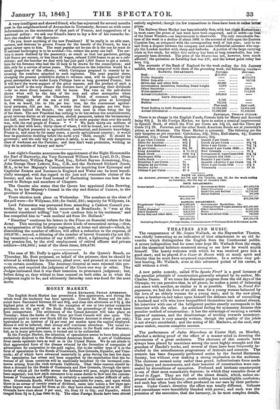A new petite comedy, called Who Speaks First? is a
good instance of the peculiar principle of construction generally adopted by its author, Mr. Charles Dance. If we trace his dramatic progress from the old days of the Olympic, we can perceive that, in all pieces, he makes a point of balancing one scene with another, as similar to it as possible. Thus, in Naval En- gagements, we had the love of an old man for a young woman balanced by the love of an elderly woman for a young man; and in the new piece, where a brother-in-law takes upon himself the delicate task of reconciling a husband and wife who have besquabbled themselves into mutual silence, his interview with one of the belligerent parties exactly corresponds to his interview with the other. An artistical feeling for symmetry dictates this peculiar method of construction: it has the advantage of securing a certain degree of neatness, and the disadvantage of tending towards monotony. The new piece is very smartly written, though the quality of the jokes is not always considered; and the acting of Mr. Mathews, as the cool, easy peace-maker, secures complete success.


























 Previous page
Previous page